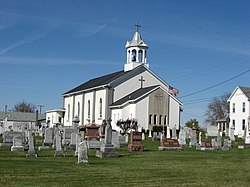Holy Family Catholic Church (Frenchtown, Ohio)
|
Holy Family Catholic Church
|
|

Church and cemetery
|
|
| Location | State Route 185 in Wayne Township, Darke County, Ohio |
|---|---|
| Nearest city | Frenchtown |
| Coordinates | 40°14′46″N 84°31′25″W / 40.24611°N 84.52361°WCoordinates: 40°14′46″N 84°31′25″W / 40.24611°N 84.52361°W |
| Area | less than one acre |
| Built | 1866 |
| Architectural style | Gothic Revival |
| MPS | Cross-Tipped Churches of Ohio TR |
| NRHP Reference # | 79002817 |
| Added to NRHP | July 26, 1979 |
Holy Family Catholic Church is a historic Roman Catholic church in Wayne Township, Darke County, Ohio, United States. Located in the unincorporated community of Frenchtown, it houses an active congregation, and it has been accorded historic site status because of its well-preserved Gothic Revival architecture.
The first settlers of northeastern Darke County and southwestern Shelby County were predominantly French. The first parish in the region encompassed the areas now divided between St. Denis Parish in Versailles, St. Remy Parish in Russia, and Holy Family Parish. This parish, originally known as St. Valbert's Church, was organized among these French settlers in 1839, with its church located 3 miles (4.8 km) northeast of Versailles; it was a mother church of the Missionaries of the Precious Blood, who were beginning to minister to the Catholic population of the region at this time. In 1846, St. Remy and Holy Family parishes were created as separate parishes, while St. Valbert relocated to Versailles and was rededicated to St. Denis in 1864.
Members of Holy Family Church quickly began to organize their congregation, completing a log church by the end of 1846; after it burned in 1848, another log church was built. At the same time, the members of St. Remy's Church were beginning to build a church, and competition began to arise between the two parishes. Ultimately, a wager was agreed upon of two gallons of whisky, to be given to the first parish to lay the log foundation for their churches; Holy Family won the prize. As more French settlers continued to arrive in the 1850s and early 1860s, the church became too small, and the members decided to erect a larger brick structure.
...
Wikipedia


